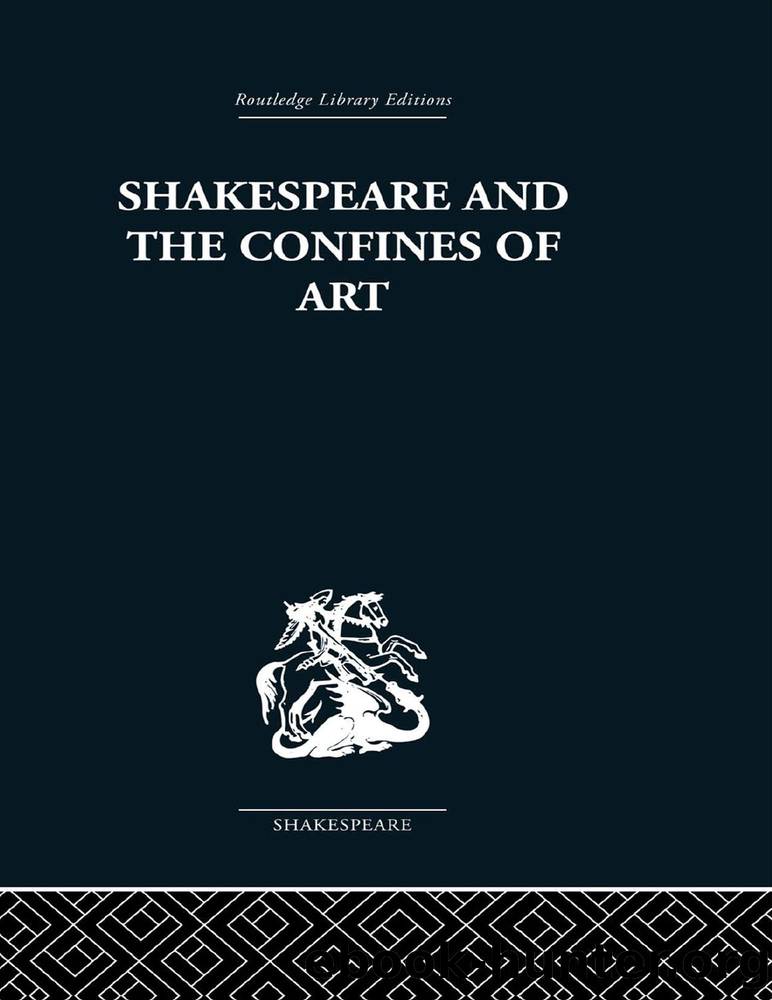Shakespeare and the Confines of Art by Edwards Philip;

Author:Edwards, Philip; [Edwards, Philip]
Language: eng
Format: epub
Publisher: Taylor & Francis Group
Published: 1968-08-15T00:00:00+00:00
But would it matter even if it were so? The quality of what Shakespeare creates seems hardly to be affected by the material pressures which may have made him start out on a given play. Whatever pushed him into writing A Midsummer Night's Dream or As You Like It or Hamlet, his creativity was free enough to make these plays landmarks in the progress of the unfettered artist.
Whether or not Hamlet rose (and rose is the word) from the deliberations of Mr Brown's committee, Shakespeare certainly found his freedom in service of another kind, service to the inner idea of the revenge play as Kyd had created it in The Spanish Tragedy (and conceivably also in the earlier version of Hamlet). The only essential reading for Hamlet is (besides Hamlet) The Spanish Tragedy. This latter play is, like Hamlet, always moving to and fro between âplayâ and ârealityâ. All the action is watched by an audience on stage, who come from the other world. Near the end of the play, the actors themselves become an audience for Hieronimo's play, a play in which the miming suddenly becomes ârealâ. In Peter Weiss's âMarat/Sadeâ play, actors play the parts of lunatics, and a play about the French Revolution is put on, which the inmates watch and join in: the revolutionaries are thus made to seem lunatics, and the real audience see themselves as both potential lunatics and potential revolutionaries. In Kyd's play, actors become an audience, and the real audience see themselves as actors, or puppets watched over by cynical observers from the underworld.
In Hamlet, too, the âplayâ at the end (the fencing-match) becomes, like Hieronimo's play, the greatest reality in a drama in which all previous serious action seems, in its ineffectiveness, to be mere play. Moreover, Hamlet's playlet in Act III, is (as Harry Levin has argued) âa working model of the play itselfâ:36 it is the means by which Hamlet objectifies the uncertainties surrounding his life, and brings home to Claudius, one of the audience, a new sense of the meaning of what he has done. The whole play is Shakespeare's objectification of uncertainties, and an appeal to the theatre-audience to accept it as reality. The vital difference between the handling by Kyd and Shakespeare of the âplay/lifeâ confusion is that in Kyd the accent is on life as a mere play, and that in Shakespeare the accent is on playing as being, in some way, life itself.
The core of The Spanish Tragedy is Hieronimo's sense of relation with the divine will. Hieronimo sets out to right a wrong, and make justice operate against the doers of evil who have killed his son. He is a lonely figure to begin with, and he becomes more and more isolated, except for the help of Bel-Imperia, as the play goes on. The conventional justice of society is shown to be a hit-or-miss affair, and Hieronimo fails to bring it to his assistance. For a moment, he is not sure whether he
Download
This site does not store any files on its server. We only index and link to content provided by other sites. Please contact the content providers to delete copyright contents if any and email us, we'll remove relevant links or contents immediately.
4 3 2 1: A Novel by Paul Auster(12372)
The handmaid's tale by Margaret Atwood(7756)
Giovanni's Room by James Baldwin(7325)
Asking the Right Questions: A Guide to Critical Thinking by M. Neil Browne & Stuart M. Keeley(5757)
Big Magic: Creative Living Beyond Fear by Elizabeth Gilbert(5754)
Ego Is the Enemy by Ryan Holiday(5413)
The Body: A Guide for Occupants by Bill Bryson(5080)
On Writing A Memoir of the Craft by Stephen King(4931)
Ken Follett - World without end by Ken Follett(4722)
Adulting by Kelly Williams Brown(4565)
Bluets by Maggie Nelson(4547)
Eat That Frog! by Brian Tracy(4525)
Guilty Pleasures by Laurell K Hamilton(4439)
The Poetry of Pablo Neruda by Pablo Neruda(4097)
Alive: The Story of the Andes Survivors by Piers Paul Read(4018)
White Noise - A Novel by Don DeLillo(4002)
Fingerprints of the Gods by Graham Hancock(3991)
The Book of Joy by Dalai Lama(3974)
The Bookshop by Penelope Fitzgerald(3843)
